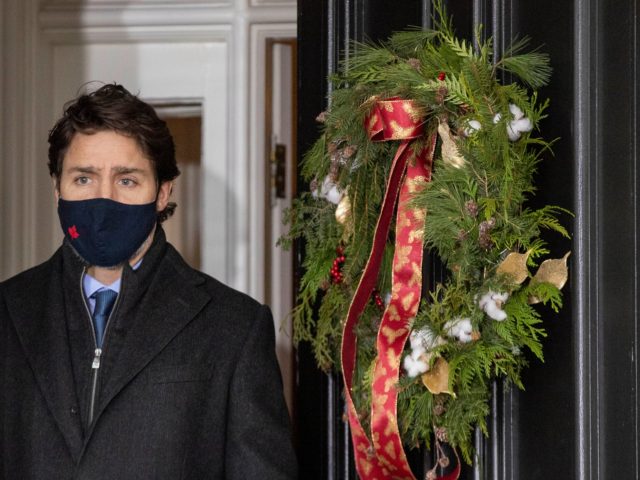Canadian Prime Minister Justin Trudeau this weekend asked the public to reconsider holiday plans and restrict travel to slow the spread of the resurgent Wuhan coronavirus.
“We all want to have a normal Christmas while, quite frankly, a normal Christmas is right out of the question,” he said.
Trudeau said he is “not looking at bringing in a federal hammer” to enforce travel restrictions at the national level. Instead, he appealed to Canadian provincial governments to come up with their own policies, apparently rebuffing British Columbia Premier John Horgan’s call last week for a “pan-Canadian approach” that would establish a unified national advisory against travel throughout the holiday season.
“I’m asking the federal government to work with us and other provinces to get the message out that if you do not need to travel between jurisdictions, you shouldn’t do that. I’m encouraging the prime minister to take this opportunity with all of us,” Horgan said last Wednesday.
“I think the idea of using the federal Emergencies Act to shut down the borders and guard those inter-provincial borders is not an idea I’m even contemplating right now,” Trudeau said.
Asked at his Friday press conference if he would respond to “calls from mayors and doctors for the federal government to step in and do more, including implementing tougher measures like a temporary lockdown,” Trudeau defended his administration’s pandemic response, saying it has always been focused on helping local and regional authorities make tough decisions while minimizing the economic damage from restrictions and lockdowns:
The best way to get through this with a strong economy is to focus on protecting Canadians, and slowing the spread of this virus. That is the decision we took from the very beginning as a government. That’s why we made the commitment to have each other’s backs, have Canadians backs, and we will, whatever it takes, and as long as it takes.
[…]
We know that this is extremely difficult on Canadians and on businesses, but the position of the federal government from the beginning has been to make the difficult decisions by regional authorities, by provincial authorities, by local public health authorities easier in knowing that businesses that have to close will get strong support from the federal government. That’s the promise we made, and that’s a promise we’re keeping.
Trudeau said his government’s official travel advisory is that “all Canadians should avoid international travel.” If they feel compelled to travel abroad, he advised them to “make sure they have good health insurance, good travel insurance,” and be certain that “wherever they’re going there is sufficient healthcare capacity.”
“We know that this will be no ordinary Christmas. It won’t be like Christmas 2019. And to what extent there will be restrictions or limits on what people can do, well, all of that will depend on the region they’re in, and it will also depend on what we manage to do together in the coming weeks,” he said.
“I don’t want to be here, you don’t want me to be here – we’re all sick and tired of Covid-19 [Chinese coronavirus]. But this virus is not going away any time soon,” he warned, speaking from the front door of his house in Ottawa.
The New York Times on Friday cited calls for Canada to embrace an extreme lockdown and quarantine agenda known as #COVIDzero on social media, essentially spreading the tough travel restrictions embraced by the Atlantic Canadian provinces to cover the entire country.
Newfoundland, Nova Scotia, New Brunswick, and Prince Edward Island are currently reporting much lower coronavirus infection rates than the rest of Canada, which is on track to reach 60,000 new cases per day by the end of the year according to the Trudeau administration, a level about 5.5 times higher than the current infection rate.
Skeptics of the #COVIDzero agenda argue it would be difficult to enforce without authoritarian government control and would be disastrous for the economy, potentially wiping out industries that are already on the brink after the first coronavirus wave.

COMMENTS
Please let us know if you're having issues with commenting.